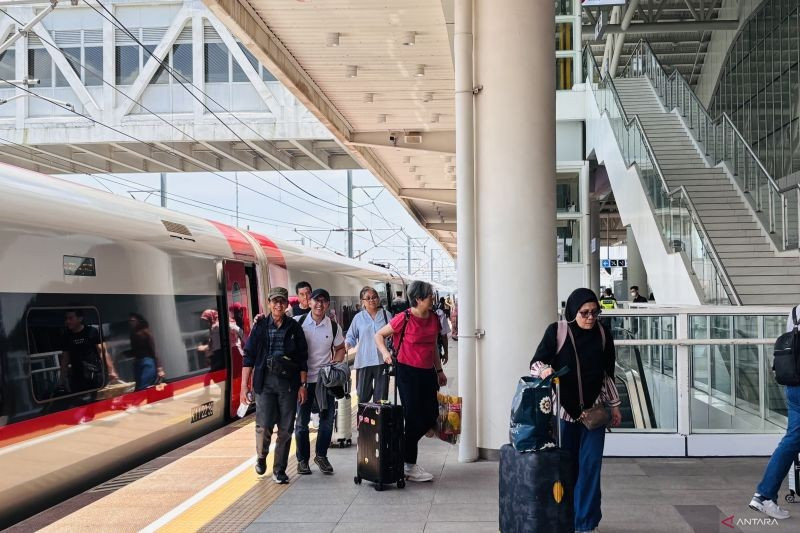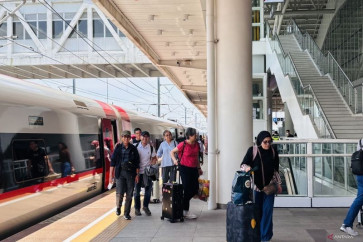Popular Reads
Top Results
Can't find what you're looking for?
View all search resultsPopular Reads
Top Results
Can't find what you're looking for?
View all search resultsAnalysis: Prabowo's plan, tackling Whoosh debt and corruption simultaneously
Change text size
Gift Premium Articles
to Anyone
P
resident Prabowo Subianto has announced that the government will assume responsibility for repaying the Rp 1.2 trillion (US$71.81 million) cost overrun debt incurred by Indonesia's first high-speed railway, Whoosh. Prabowo justified the government's intervention by framing the railway as a public service obligation (PSO), arguing that its benefits extend beyond profit. He further stated that the government intends to fund the repayment using assets recovered from corruption cases, though the feasibility of this approach remains uncertain.
Whoosh, operated by PT Kereta Cepat Indonesia China (KCIC), a joint venture between Indonesian and Chinese state-owned enterprises, has struggled to meet its financial obligations due to lower-than-expected ridership since its 2023 launch. Pressure to repay the Whoosh debt has been mounting as loan obligations to the China Development Bank (CDB) near maturity at the end of the year, with interest on the project's massive principal soon set to accrue. The Indonesian consortium PT Pilar Sinergi BUMN Indonesia (PSBI)—which represents the state-owned partners in the KCIC joint venture—has already been strained by the project's weak financial performance, recording Rp 4.19 trillion in losses last year, according to the financial report of state railway operator KAI.
To briefly recap, the Jakarta-Bandung Whoosh project was developed through a joint venture under PT Kereta Cepat Indonesia China (KCIC)—a consortium between Indonesian and Chinese state-owned enterprises—with loans from the CDB accounting for around 75 percent of the total investment. Originally projected to cost US$6 billion, construction expenses ballooned to US$7.27 billion for the 142-kilometer Jakarta–Bandung route. Despite its status as Indonesia's high-speed railway (HSR), the project continues to face commercial headwinds as ridership remains below initial projections. The combination of rising operational costs and accruing loan interest has transformed the venture into what many analysts describe as a "financial time bomb."
Notably, only a few weeks prior to President Prabowo's statement, Finance Minister Purbaya Yudhi Sadewa asserted that the government had no plans to allocate funds from the state budget to settle KCIC's obligations, emphasizing that the financial responsibility rested with the consortium and not the state.
President Prabowo Subianto suggested that Indonesia has enough corruption proceeds to cover the Whoosh cost overrun debt, meaning the government could simply redirect recovered assets toward productive use instead of relying on taxpayer money. While Prabowo's proposal to use recovered corruption assets has been interpreted by some as a symbolic gesture reinforcing his anti-corruption stance, its literal implementation raises legal and practical concerns. Funds seized from criminal cases are highly irregular and unpredictable, as they are typically used to cover prosecution and investigation costs under the scheme outlined in Law No. 31/1999 on Corruption Eradication (as amended by Law No. 20/2001).
In practice, these assets are managed or auctioned through the State Asset and Auction Service (KPKNL) under the Finance Ministry, with the proceeds deposited into the state treasury as non-tax revenue (PNBP). However, the process is lengthy and often yields irregular inflows, making it an unreliable source for financing ongoing obligations such as the Whoosh debt.
Nevertheless, this would inevitably result in either a direct allocation from the state budget (APBN) to cover the Whoosh debt or a diversion of potential APBN revenue away from other programs. Furthermore, if this decision is finalized, it would set a precedent for future bailouts of state-linked projects that fail to meet financial expectations, blurring the line between public service and commercial accountability.



















